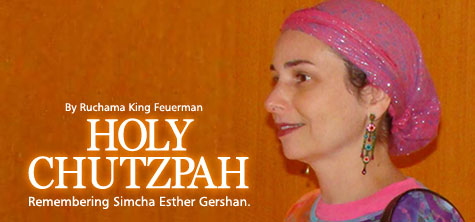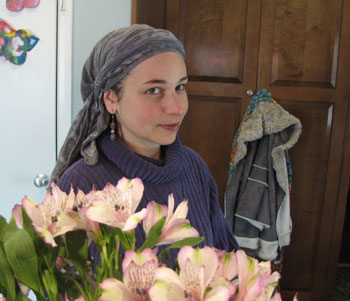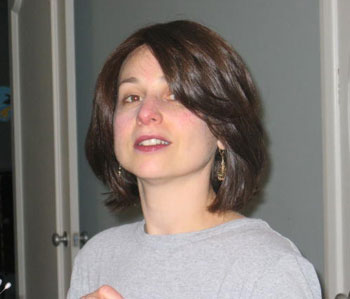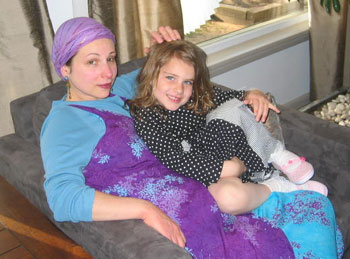 Iran’s Attack on Israel
Iran’s Attack on Israel


10 min read
Remembering Simcha Esther Gershan.
When I see Dearest Friends in an email subject line, I get a dread feeling. My friend Shari, 41, mother of four young children, married to Yoni Gershan, an old classmate of mine from Silver Spring, lets us know she has been diagnosed with stage 4 lung cancer. Prognosis: a few months. And she doesn’t want phone calls, just emails. It’s a little before Pesach, 2008.
We’re in shock, as is everyone in the Passaic community. Shari’s the most passionate, visionary, assertively alive woman I know. Never smoked a cigarette in her life, a health buff, a gourmet cook, featured in Bon Appeti for her multi-cultural extravaganzas when she worked at the U.N. in her twenties. Shari's my education mentor. Two of my kids at one point attended the Montessori-based Yeshiva that she co-founded and directed.
 The woman’s got a holy chutzpah. Here she is, a ba’alas teshuva, did not grow up religious, never went to a formal Yeshiva, a young woman, and she’s blazing a new path in Jewish education? The nerve, the holy nerve of it all.
The woman’s got a holy chutzpah. Here she is, a ba’alas teshuva, did not grow up religious, never went to a formal Yeshiva, a young woman, and she’s blazing a new path in Jewish education? The nerve, the holy nerve of it all.
Whatever she does, it’s with flair and feeling. Who can forget her gorgeous Shabbos tables, her uplifting and beautifully arranged Tu B'Shvat Seders, her hilarious color war Purim meals, her clever, artful way with a mere head scarf, and how she can enter an Annie-Sez store and come out looking as if she’s shopped in an upscale boutique? And this woman has got six months left? No way!
She looks like a high school girl, for goodness sake, not a woman dying of cancer. Why is she so happy?
Shari and husband spring into action. They set up a matching fund for various charities. Seven poor brides in Israel get launched, and unwanted babies are saved through Efrat-CRIB, and too many other mitzvahs and merits to mention. Her husband, Yoni, dedicates the Torah class he gives every week to Shari. Using her skills as a former theater director she organizes all the people offering help: the cooks, the carpool drivers, the homework helpers and babysitters, the psalms reciters, and others. She creates a blog and a website www.timeofmylife.us, and starts telling her friends, in weekly email installments about her harrowing ordeal:
"I had two horrible things growing on my spine and it was eating my bone...They prepped me for CAT scans to see where else it was eating me alive. Complete scans of my entire body, including details of my brain. I started to shake. I was so cold."
I hang out with Shari and give her foot massages, the only part of her that doesn’t hurt. Shari’s changing. She loses some of her bluntness that often got her into trouble, but thank God keeps her honesty. She drops resentments she’d been carrying for years (anyone deeply immersed in communal work is bound to pick up a few enemies). Her skin has a fresh-faced glow. She looks like a high school girl, for goodness sake, not a woman dying of cancer. Why is she so happy? A medical friend suggests it’s the steroids.
Shari writes:
"I am not afraid of dying -- at least not today....So desiring to see myself the way Hashem sees me. I want to meet that me. Whatever this is supposed to bring me to, I want to get there. I hope I don’t run out of time."
It becomes clear she’s on a journey of some kind. She begins to use her Hebrew name, Simcha Esther. ”Joy’s my weapon,” she says. Her blog hits multiply exponentially. People in Israel, France, England, and pockets all over America get inspired to make changes in their life, to learn more Torah, to fix relationships, to laugh more. "If Simcha Esther can do it, so can I," becomes the mantra. In writing this blog, she’s holding our hands and taking us all with her. Certain estranged members in the community begin to smile at each other. Her father, for the first time, commits to laying tefillin. She’s forming a new community, on the blog and in real life, of transformation.
Simcha Esther writes, incredibly: ”I don’t want my old life back.”
I find it all a little too much. It strains credulity, or at least mine. When Simcha Esther tells me she actually looks forward to getting chemo at Sloan Kettering every week, I decide I have to go with her.
It’s Wednesday and we’re in the car with Ella, Atara, Tsvika Tal, an Israeli filmmaker who’s getting footage for her documentary, “Time of My Life,” and Yoni. She calls her group Team Simcha. After the blood work, Simcha Esther meets her new oncologist, and a heartrending conversation follows.
“Do you believe in miracles?” Simcha Esther asks or rather demands.
The oncologist says, “Yes, I believe in that possibility.”
“Is it possible that I could recover?”
Simcha Esther gets a one-in-a-million odds. I watch her eyes tear up and I look away.
 Here, the oncologist looks uncomfortable and fudges some answer. Simcha Esther gets a one-in-a-million odds. I watch her eyes tear up and I look away. Later in the taxi, Ella tries to comfort her with a beautiful, spiritual tale but Simcha Esther cuts her off mid-parable. ”I’m tired of that rock-paper-scissors thing.” She looks grumpy, weepy, so very low, and as I sit beside her, for the first time I deeply connect with her journey. Because when she’s low, it’s with the fullness of her being, and when she’s flying, she’s flying with her whole self, too.
Here, the oncologist looks uncomfortable and fudges some answer. Simcha Esther gets a one-in-a-million odds. I watch her eyes tear up and I look away. Later in the taxi, Ella tries to comfort her with a beautiful, spiritual tale but Simcha Esther cuts her off mid-parable. ”I’m tired of that rock-paper-scissors thing.” She looks grumpy, weepy, so very low, and as I sit beside her, for the first time I deeply connect with her journey. Because when she’s low, it’s with the fullness of her being, and when she’s flying, she’s flying with her whole self, too.
We turn into Dave and Buster’s, an arcade. It’s mid-morning and we have the place practically to ourselves. We flit from game to game, shooting fake terrorists, riding ersatz motorcycles, and attempting that floor-light-up-dancing thing. Then it’s off to Olympic Pita and then we rush back to Sloan Kettering for the blood results. She arranges her schedule so that the chemo work is just a blip on the screen of a wonderful day. And I have to admit, I’ve had a blast.
On the ride up in the elevator, Simcha Esther says, “It’s too quiet in here,” and Yoni turns to the other subdued-looking cancer patients. ”Any song requests?” he asks. Someone offers hesitatingly, “We Shall Overcome?” and Yoni begins in a low baritone and they all sing together as the elevator rises.
These people, Simcha Esther and Yoni, want to take everyone higher. I want to be where Simcha Esther is. She’s a shooting star, a comet, and I’m holding onto the tail. And when she sinks, I want to be there with her. Thousands of people feel as I do. People who have never met her speak of her as their friend and spiritual guide. By now she has about 30,000 hits on her blog. If she’s late posting a message, emails start flying worriedly across the Atlantic.
Five months since the diagnosis Simcha Esther runs out of money for the documentary she’s making. A family friend, the famous musician Chaim Dovid, offers to throw a benefit concert, and the money is raised. But frankly, at this point, Tsvika the filmmaker is charging very little. He also has fallen under the spell of transformation.
 Thirteen months later, Simcha Esther has gone way past her prognosis. We play Balderdash on Saturday nights, and infuriatingly, she creams us all. She is so focused on using every second for good, or fun, so clear-minded and has never looked more beautiful that we all start believing she will transcend statistics, that they simply don’t apply to her.
Thirteen months later, Simcha Esther has gone way past her prognosis. We play Balderdash on Saturday nights, and infuriatingly, she creams us all. She is so focused on using every second for good, or fun, so clear-minded and has never looked more beautiful that we all start believing she will transcend statistics, that they simply don’t apply to her.
But about two months ago, everything begins to crash.
She gets the aides to burst out laughing whenever they enter, or else she gets them to pray.
When I visit her at a rehab center in Wayne so she can learn to walk without cracking her bones, she’s pumped up with drugs. Still, her personality manages to break through. At Hackensack Hospital, she gets the aides to burst out laughing whenever they enter, or else she gets them to pray. They love her, though when another aide tends to her too brusquely, Simcha Esther fixes the nurse with a look that makes the woman shrink back and apologize. Even as she hangs on to life by a gossamer wisp, I love how Simcha Esther recognizes when someone has crossed a certain line. .
Thousands of people are praying for her, rallying for her, taking on mitzvahs to incur merit on her behalf.
A shift takes places. Everything starts moving too fast. The next week she’s mostly unconscious, with rare periods of wakefulness. She looks lovely, her moon face luminous. But her skin gets that waxy, thick feel that I recognize from when I used to volunteer for the Hevra Kadisha. I’m heartsick. I’m no longer praying for a miracle but for one last conversation.
Right after Rosh Hashana I speak with Iris, who has not left her daughter’s side for five weeks. “Simcha Esther’s awake," she says. "Come!”
I rush over to Hackensack with my husband. Shari, hooked up to tubes now, lifts her chin ever so gently and says, “Howdy.” My husband softly sings “Shifchi K’mayim“ while I massage her, and he turns to her brother, David, and together they offer up a folk song. I say, “I love you,” when it’s time to leave, ducking my head to hide the tears, because she doesn’t like that, and she says, “I love you, too.”
When Simcha Esther is transferred to a hospice, the nurses and aides gather and they break down, sobbing hysterically, hugging each other and weeping.
The stream of visitors keeps flowing but now she barely awakens, except for her oldest child, Akiva, 12. I see her a few days later. She is totally unconscious but I try to sing her back to life. I sing to her a song of herself, her deeds, her accomplishments. I like to think she hears something.
The day before Yom Kippur Tsvika the filmmaker leans in and says something funny to her. Amazingly, she wakes up and grins, then lets out her trademark belly laugh. Thrilled, everyone in the room quickly gathers as she starts laughing and joking. Shortly after, she sinks back.
She dies on Yom Kippur, just as Neilah begins.
The nurses give Simcha Esther her bath in utter quiet, tenderness flowing from their fingertips.
She dies on Yom Kippur, just as Neilah begins.
It aches all over just to think of her gone.
She leaves behind her devoted and incredible family, the teachers she trained and inspired, the paintings and ceramics she made, her healthful recipes, the stories she wrote, the people she loved and who loved her back, the school children she formed, the community she created. As for the prayers she helped us all say, she’s taking those with her.
Her documentary, “Time of My Life” premiers Thu, Oct 22 at 7:30 pm Peter Jay Sharp Theatre. Go to: http://www.symphonyspace.org/event/6032-time-of-my-life for more information.
To join the TimeOfMyLife mailing list and be notified about future showings, film premieres in your city, DVD availability and other news, go to: http://timeofmylife.us/signup.asp?pg=gb
